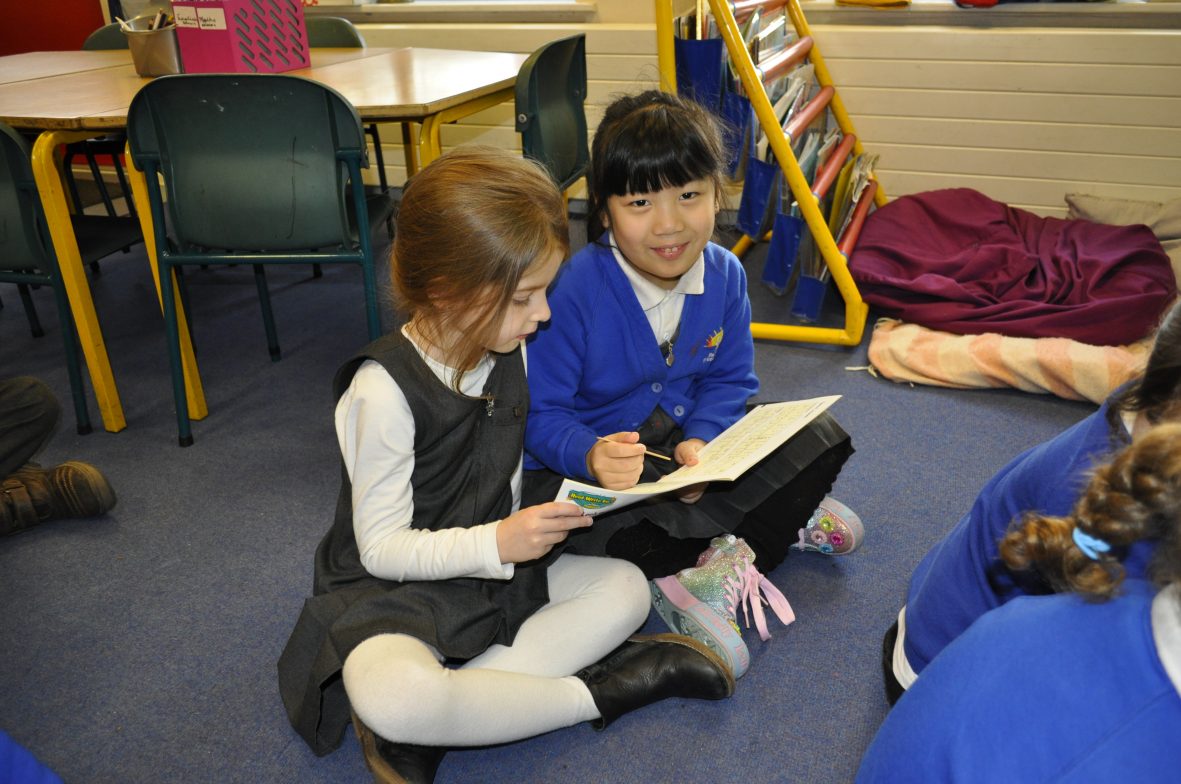Intent
At Barn Croft, we believe that a quality English curriculum should develop children’s love of reading, writing and discussion. We have a rigorous and well organised English curriculum that provides many purposeful opportunities for reading, writing and discussion. We empower our children with a high-quality, broad, coherent and creative English curriculum so that they can communicate not just ideas, but also emotions to others. Our children understand that there are different purposes and audiences and can adapt the way they communicate according to these. We recognise the importance of promoting a culture where children take pride in their writing, providing opportunities to showcase individuality and flair, drawing upon the wide range of quality texts that the children enjoy in lessons and as readers. All English lessons are based on the same high-quality text the children are studying for reading lessons; teaching and learning is planned sequentially across the school to revisit, consolidate and extend learning regularly.
We know that success in English is key to success in reading. Our fundamental aim is to teach every child to read as early as possible through a consistent, systematic and rigorous approach to phonics teaching which enables children to read accurately and fluently as well as developing good early comprehension. Through a shared love of books in class, children develop as passionate readers and supported by our wider curriculum and enrichment, we aim to inspire an appreciation of our rich and varied literary heritage as well as a habit of reading widely and often. Children will experience the shared reading of a broad range of texts and they will build a strong understanding that reading is for pleasure as well as gaining information across the curriculum. Teachers will directly teach ambitious vocabulary drawn from the books and texts read, as well as the wider curriculum and the world around them so that children have a rich vocabulary when they progress onto secondary education and are able to make connections between texts, their lives and the wider world.
We believe that teaching children to articulate their ideas, to express themselves clearly through well- formed speech and to listen attentively so as to understand what is said to them is crucial to their educational success. Although speaking and listening comes under English in the National Curriculum, the entire curriculum is exploited for this purpose because it not only fosters children’s intellectual development and enjoyment of learning but also boosts their self-confidence, social and emotional development and motivation to learn.
Implementation
At Barn Croft, our curriculum closely follows the aims of the National Curriculum for English 2014 to enable all children to:
- read easily, fluently and with good understanding
- develop the habit of reading widely and often, for both pleasure and information
- acquire a wide vocabulary, an understanding of grammar and knowledge of linguistic conventions for reading, writing and spoken language
- appreciate our rich and varied literary heritage
- write clearly, accurately and coherently, adapting their language and style in and for a range of contexts, purposes and audiences
- use discussion in order to learn; they should be able to elaborate and explain clearly their understanding and ideas
- are competent in the arts of speaking and listening, making formal presentations, demonstrating to others and participating in debate.
These aims are embedded across our English lessons and the wider curriculum. We will provide the means for children to develop a secure knowledge-base in English, which follows a clear pathway of progression as they advance through the primary curriculum. Rigorous assessment, moderation and review will ensure that we are able to provide targeted support so that all children experience success in English; we believe that a secure basis in reading and English skills is crucial to a high quality education and will give our children the tools they need to participate fully as a member of society.
Across our school, a shared love of reading is promoted at all opportunities. A rigorous programme of systematic synthetic phonics provides children with the early tools for reading and English. Children are taught to write for a range of purposes and audiences with strong links across the curriculum and to local and global issues. High-quality texts are chosen for purpose in each year groups curriculum and the children’s strong understanding of grammar and transcriptions skills enable them to flourish as writers. The English curriculum is planned sequentially throughout the school and focuses on revisiting, consolidating and extending children’s learning across the year and their time at primary school.
When planning English lessons, teachers make links to other areas of the curriculum, where possible, to provide further context for the learning. Units of work focus on fiction, non-fiction or poetry, in line with the 2014 National Curriculum and comprehension, grammar and writing are embedded in lessons. Lesson sequences build progressively towards an extended piece of writing. Writing expectations are uniform across all subjects and we promote a high levels of pride and presentation across all written outcomes.
To enrich the English curriculum, we hold annual reading and poetry weeks as well as book days, including visiting poets and authors. Children enter local and national writing competitions as well as writing for a range of purposes in a variety of subjects. Children also participate in a variety of trips and visits to enhance their English curriculum, for example visiting the British Library. These experiences include trips to museums, art galleries, nature reserves, the theatre and community projects which provide children with stimulating real-life experiences to pin their reading, writing and speaking development to. English learning is practised and embedded across the curriculum. Speaking and writing outcomes draw from knowledge gained in other subjects and English skills are used to enhance learning elsewhere.
Handwriting is an important skill that is carefully taught throughout the school. At first, children concentrate on the correct letter shape and the spacing of words. Cursive handwriting is introduced in Year 2. As children become more experienced writers, regular handwriting practice is still carried out with the aim of producing clear and fluent handwriting.
Impact
Assessment for learning is embedded in English lessons, in the form of verbal feedback at the point of learning and children are active in reviewing the successes in their work and identifying, with support from their teacher, target areas for development to ensure a continuous and individualised approach to improving their work.
The staff at Barn Croft use a variety of strategies to evaluate the knowledge, skills and understanding that our children gain as they move through the school. Our feedback policy ensures feedback is live in lessons and has the most impact on the children’s progress and attainment in writing. Teacher feedback and formative assessment is utilised to adapt and enhance lesson design, based on the emerging needs of the class, and maximise progress for all children. We regularly moderate writing with other schools locally and provide CPD to ensure that teacher pedagogy and assessment is secure and so that teachers develop a high level of subject expertise. Termly assessments of independent writing ensure our children are provided with appropriate challenge and support. Subject monitoring is undertaken regularly, including book looks and learning walks, to ensure ambitious educational standards are achieved and maintained for all children.

